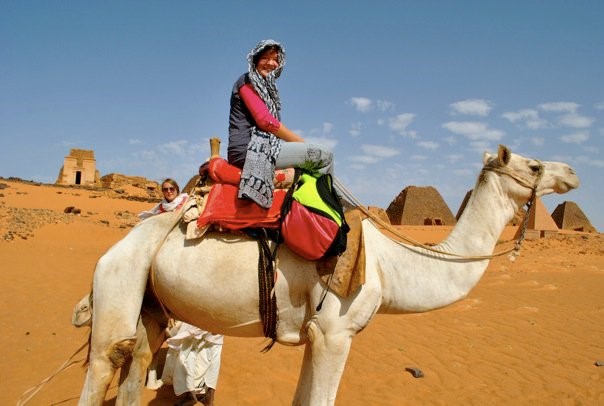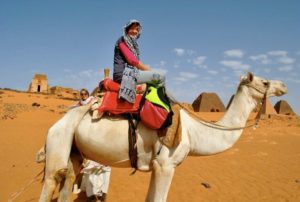

Joy, amazement, admiration, shock and even fear – you can experience all when you travel. Traveling means more than just sightseeing; it is to explore the world out there without knowing what is waiting for you in new lands – new cultures.
Aria Morton probably knows the meaning of traveling better than anyone her age. The young American girl had traveled to various countries and made friends from all over the world before she even started college. She moved to Egypt with her family at the age of 15, went to Rift Valley Academy in Kenya, and then started her trips to Tunisia, Uganda, Sudan, Italy and France.
Morton is now pursuing a master’s degree in nonprofit communication at Drury University and working with international students as an assistant in the International Support Services Office. Recalling her overseas journeys, she is proud that she has learned meaningful lessons about unique cultures and people around the world.
The Scoop’s Ngoc Diep Bui sat down with Morton recently to discuss her traveling experience and her thoughts on working with international students.
What encourages you to travel and learn about new cultures?
It started when I was a little kid. My mom took us to the library once a week. I remember I always went to the geography section and read books about a tribe called Maasai in Southern Africa. My parents always had people in our house from all over the world for Thanksgiving dinner, even before we moved. It was always a part family culture. Then they asked us if we ever wanted to think about moving to Africa. We were very excited, even sometimes scared. So it’s a part of my family that encourages me to travel.
How did you feel when coming to a foreign country with new people, new culture and new language?
In all of different places, it got easier each time I moved. When I first moved to Egypt, it was really challenging to figure out how to live without speaking the language. Then we moved to Sudan; that was challenging but I knew a little bit more. Each time I move, I acquire more skills of how to navigate new places without knowing anything.
Probably, the most challenging thing is to feel at home. I belong to different places. You can learn to travel on a metro easily; you can learn how to ride a bus easily. But connecting with people in a way you really feel you belong can be more challenging. [It is] the difference between people.
People who travel to different countries generally talk a lot about culture shock. Have you ever experienced such a thing before?
Definitely. It was very hard. When we first moved to Egypt, I was 15. Being 15was hard in general; [I was] very emotional. In nine months in Egypt, I went through a hard time of missing home and being lonely. Coming back to college was just a different culture shock then, just loneliness and stuff like that. But I think the experience of being lonely makes me a lot more sensitive to other people who aren’t at home. I’m thankful for it.
What do you think is the most memorable experience that you had during your trips?
One I can remember that came to my mind immediately. When we were living in Sudan, we went to a place in the middle of the desert. In Sudan, it’s not much of anything that you can see, just highway and desert. We were eight hours outside of Khartoum and our van got a flat tire. Sitting in the heat, we were stuck in the middle of the city. It got up to 100 degrees in the summer. We didn’t know what to do and didn’t have much water and food.
We looked out across the desert, and we saw like a couple of people walking and approaching us. It didn’t look like there was anything out there. We kept watching them and they kept walking. It ended up being two girls from a nearby village to come bring us water. Somehow they knew we were there. I don’t know how it reached the village, but they were there so they brought us containers of water for us to drink and [then] disappeared back into the desert. It shows their hospitality.
What do you think is the most interesting part of your job?
There are so many things. One interesting part is learning how to adapt into new situations with all new people coming from different backgrounds. So [I am] consistently expecting things not to go like [I] expect them to. I learn how problems are solved, and thinking quickly has been one thing I learned so far. And that’s great to meet all different people and see countries that were just places on the map, but now I really care about them because I know people from them.
I definitely think that each person I met helps to break the stereotype that I’ve had about different places, or helps me recognize that each person, even coming from a general culture, is so unique and so valuable and cool.
Do you think traveling helps you so much in your pursuit of career?
Yes, I really think it does. Because it helps me understand what American might say it can be at some point and then recognize that other points of view and other ways of viewing community, success and different things are still valid and valuable, even though it might be different from the ones that I cling to. It helps me experience life more richly because I’m more open to other people’s ideas.
For people who love to travel, for ones who are studying abroad or international students in different countries, in the U.S, do you have any advice for them?
One thing I like to practice in general, which I think helps with any situation, is trying to do one brave thing every day, whether it is just a tiny thing like reaching out to somebody who I may be a little intimidated by, or deciding to submit that article to a magazine. Taking one brave step every day can stretch you, grow you and help you experience so much more then you do otherwise.